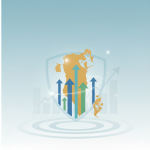Abstract:
Nowadays, both of public-sector and private sector have become stronger than before because of the challenging economic environment worldwide. Therefore, to meet new demands and these challenges, human capital should be managed appropriately in organizations.
Several studies have discussed the impact of strategic human resource management (HRM) on organizational performance and capability in diverse industry sectors. The linkages between strategic HRM, organizational learning capability, and a learning culture on the one hand and organizational performance and the innovation capability of public sectors on the other, remains unexplored from the resource-based perspective.
This paper attempts to present a conceptual framework to understand the importance and impact of strategic HRM practices and organizational learning capability on the overall performance of an organization. At the same time, the role of learning outcomes is also examined as an intervening variable in this relationship. As per previous research conducted in the area of strategic HRM and organizational performance, it is observed that strategic HRM has a positive impact on the overall performance of the public sector. At the same time, organizational learning capabilities and the prevailing learning culture enhance the performance of the organization in terms of innovation and tangible learning outcomes. Moreover, strategic human resource (HR) practices are one of the most important factors in enhancing and maintaining employees’ skills per the developmental needs of individuals and organizations in the public sector. Thus, the conceptual framework in this study encompasses strategic HRM practices, organizational learning capabilities, and learning culture as independent variables and organizational performance as a dependent variable, with learning outcomes as an intervening variable.
The data for this study were collected from the public sectors in Sharjah. The survey conducted in this study consists of two phases. In the first phase, we obtain the data needed from HR managers. In the second phase, we collected the data from employees at different levels in the organization, the number of respondents is 366 and the response rate is 66.5%.
The analysis showed significant results in the effects of strategic HRM practices, organizational learning capabilities, and learning culture on perceived organizational performance and innovation capabilities with reference to several elements such as the size of the organization (small, medium, large), sector types (social development, government administration, infrastructure, economic development), and employees’ experience.
آمنه سالم حمد لغويص السويدي
جامعة دبي – 2018




